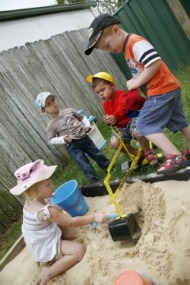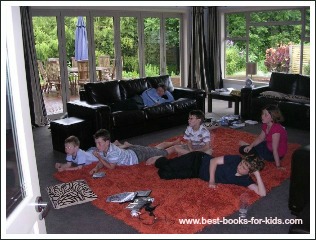The Effects Of TV On Children
Recent studies into the effects of TV on children have highlighted some major problems with the viewing habits of our children.
In a nutshell, the problems are that watching TV:
- affects the way the brain is wired which in turn affects the child’s ability to concentrate;
- takes up time that children need to engage in activities that are important for their development, especially reading;
- has a detrimental effect on the way babies and young children learn critical language skills;
This page looks at each of these issues in turn.
TV & A Baby's Brain
A study done by the American Academy of Pediatrics (AAP) found a link between high levels of TV viewing in young children and a later diagnosis of ADHD.
Doctors believe that watching TV in the crucial early years when a child's brain is developing may actually cause the brain to be wired to respond more to the TV environment than the natural environment.
Another study done in New Zealand showed similar results. It found that attention problems in adolescence were directly related to the amount of TV the teens had watched as children.
For this reason, doctors are now recommending that babies under the age of two do not watch TV at all.
TV vs Other Activities
A Canadian study published in 2010 also found that watching TV negatively affects development.
The lead author of the study said that pre-school is a critical time for brain development and that watching TV displaced time that could be spent engaging in ‘developmentally enriching tasks’.
This is really the biggest problem with children and TV - the problem of what children are not doing while they're sitting in front of the screen.
 |
Think of the things young children like to do.
They like to …
- draw
- play with blocks and other toys
- 'help’ cook or garden
- go shopping with mum or dad
- play dress ups
- ride push-along bikes
- play in a sandpit
- kick a ball
- play at the playground
- listen to stories
- play with playdough ...
As well as being fun, these activities are all helping to develop their eye-hand co-ordination, manual dexterity, cognitive abilities, communication skills, imagination, social skills and gross motor skills.
Young children who watch a lot of TV miss out on all the fun and on the developmental benefits these activities bring.
Effects of TV on Children: Older Kids
 |
Older children also miss out when they watch a lot of television.
Think of all the things they're not doing while they’re sitting passively in front of the TV.
Just for starters, while they're watching TV they're not:
- playing board games
- making and playing with friends
- helping out around the house
- interacting with the rest of the family
- riding bikes and making cubby houses
- playing sport
- doing homework
- drawing or doing craft
... and the big one - reading!
Again, these activities are all very important for children.
They’re important for their physical health, for the development of their social skills, for their self-esteem and for their cognitive development.
home >>> importance of reading >>> effects of TV on children




